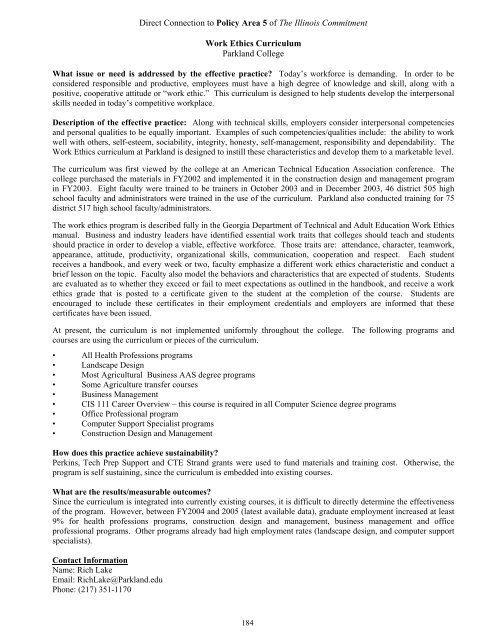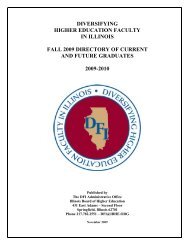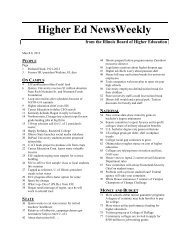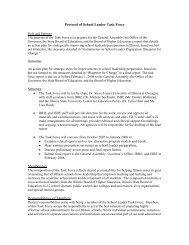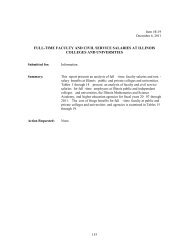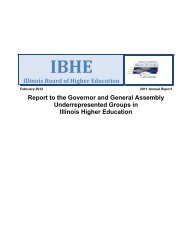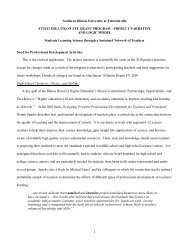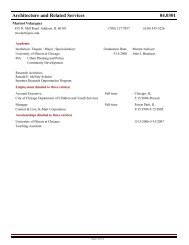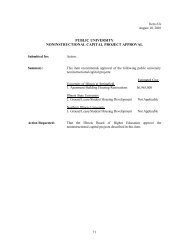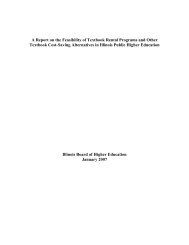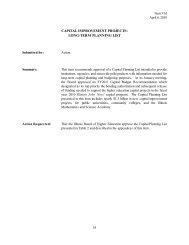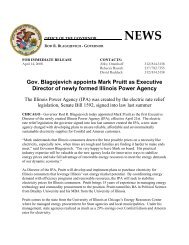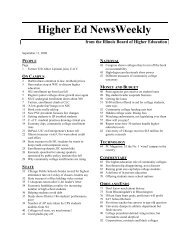Title of Effective Practice: - California Postsecondary Education ...
Title of Effective Practice: - California Postsecondary Education ...
Title of Effective Practice: - California Postsecondary Education ...
Create successful ePaper yourself
Turn your PDF publications into a flip-book with our unique Google optimized e-Paper software.
Direct Connection to Policy Area 5 <strong>of</strong> The Illinois Commitment<br />
Work Ethics Curriculum<br />
Parkland College<br />
What issue or need is addressed by the effective practice? Today’s workforce is demanding. In order to be<br />
considered responsible and productive, employees must have a high degree <strong>of</strong> knowledge and skill, along with a<br />
positive, cooperative attitude or “work ethic.” This curriculum is designed to help students develop the interpersonal<br />
skills needed in today’s competitive workplace.<br />
Description <strong>of</strong> the effective practice: Along with technical skills, employers consider interpersonal competencies<br />
and personal qualities to be equally important. Examples <strong>of</strong> such competencies/qualities include: the ability to work<br />
well with others, self-esteem, sociability, integrity, honesty, self-management, responsibility and dependability. The<br />
Work Ethics curriculum at Parkland is designed to instill these characteristics and develop them to a marketable level.<br />
The curriculum was first viewed by the college at an American Technical <strong>Education</strong> Association conference. The<br />
college purchased the materials in FY2002 and implemented it in the construction design and management program<br />
in FY2003. Eight faculty were trained to be trainers in October 2003 and in December 2003, 46 district 505 high<br />
school faculty and administrators were trained in the use <strong>of</strong> the curriculum. Parkland also conducted training for 75<br />
district 517 high school faculty/administrators.<br />
The work ethics program is described fully in the Georgia Department <strong>of</strong> Technical and Adult <strong>Education</strong> Work Ethics<br />
manual. Business and industry leaders have identified essential work traits that colleges should teach and students<br />
should practice in order to develop a viable, effective workforce. Those traits are: attendance, character, teamwork,<br />
appearance, attitude, productivity, organizational skills, communication, cooperation and respect. Each student<br />
receives a handbook, and every week or two, faculty emphasize a different work ethics characteristic and conduct a<br />
brief lesson on the topic. Faculty also model the behaviors and characteristics that are expected <strong>of</strong> students. Students<br />
are evaluated as to whether they exceed or fail to meet expectations as outlined in the handbook, and receive a work<br />
ethics grade that is posted to a certificate given to the student at the completion <strong>of</strong> the course. Students are<br />
encouraged to include these certificates in their employment credentials and employers are informed that these<br />
certificates have been issued.<br />
At present, the curriculum is not implemented uniformly throughout the college. The following programs and<br />
courses are using the curriculum or pieces <strong>of</strong> the curriculum.<br />
• All Health Pr<strong>of</strong>essions programs<br />
• Landscape Design<br />
• Most Agricultural Business AAS degree programs<br />
• Some Agriculture transfer courses<br />
• Business Management<br />
• CIS 111 Career Overview – this course is required in all Computer Science degree programs<br />
• Office Pr<strong>of</strong>essional program<br />
• Computer Support Specialist programs<br />
• Construction Design and Management<br />
How does this practice achieve sustainability?<br />
Perkins, Tech Prep Support and CTE Strand grants were used to fund materials and training cost. Otherwise, the<br />
program is self sustaining, since the curriculum is embedded into existing courses.<br />
What are the results/measurable outcomes?<br />
Since the curriculum is integrated into currently existing courses, it is difficult to directly determine the effectiveness<br />
<strong>of</strong> the program. However, between FY2004 and 2005 (latest available data), graduate employment increased at least<br />
9% for health pr<strong>of</strong>essions programs, construction design and management, business management and <strong>of</strong>fice<br />
pr<strong>of</strong>essional programs. Other programs already had high employment rates (landscape design, and computer support<br />
specialists).<br />
Contact Information<br />
Name: Rich Lake<br />
Email: RichLake@Parkland.edu<br />
Phone: (217) 351-1170<br />
184


